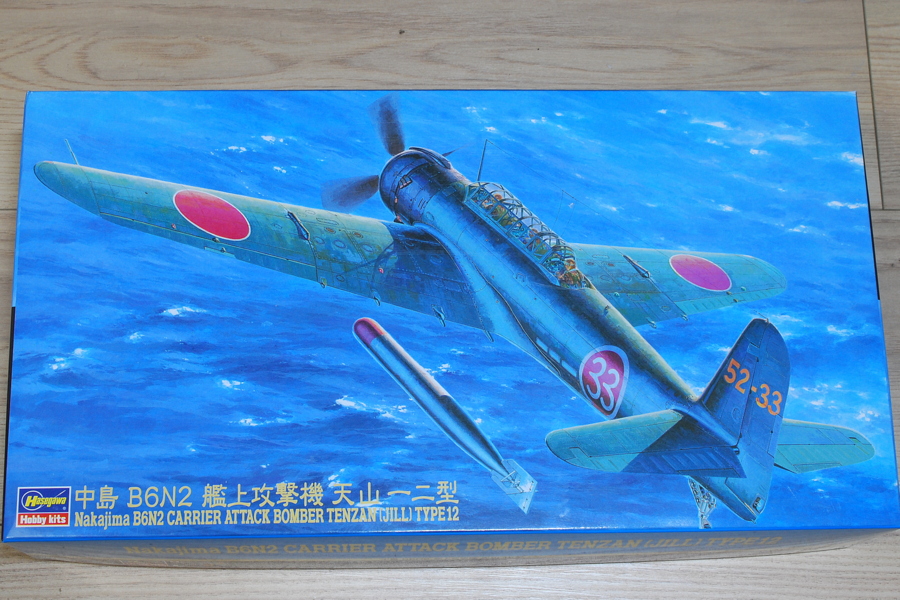 I will try to make this 1/48 Tenzan of Hasegawa kit. I look forward to this kit because it’s reputable and easy to assemble. I want to complete it without much trouble.
I will try to make this 1/48 Tenzan of Hasegawa kit. I look forward to this kit because it’s reputable and easy to assemble. I want to complete it without much trouble.
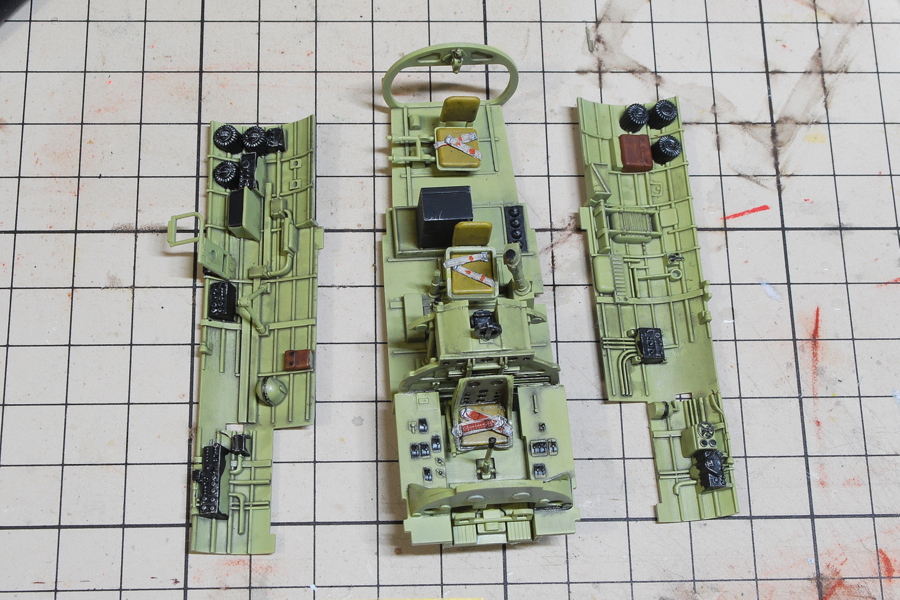 The instruction has a color mixing guide in the cockpit interior painting. I used Mr. Color No.127 Nakajima-type cockpit color.
The instruction has a color mixing guide in the cockpit interior painting. I used Mr. Color No.127 Nakajima-type cockpit color.
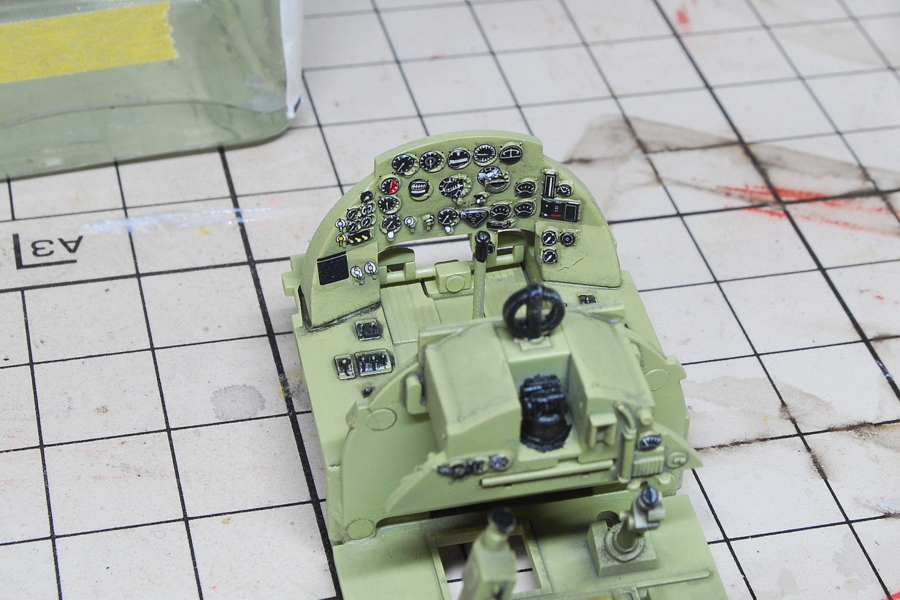 A sharp mold expresses detailed meters, and a decal is prepared, so when combined, a cockpit panel completes quite realistically. I’m thankful for a decal. I try to make them stick, and I have slipped some meters, but the atmosphere isn’t bad. It can’t be painted with a brush; It’s a nice decal.
A sharp mold expresses detailed meters, and a decal is prepared, so when combined, a cockpit panel completes quite realistically. I’m thankful for a decal. I try to make them stick, and I have slipped some meters, but the atmosphere isn’t bad. It can’t be painted with a brush; It’s a nice decal.
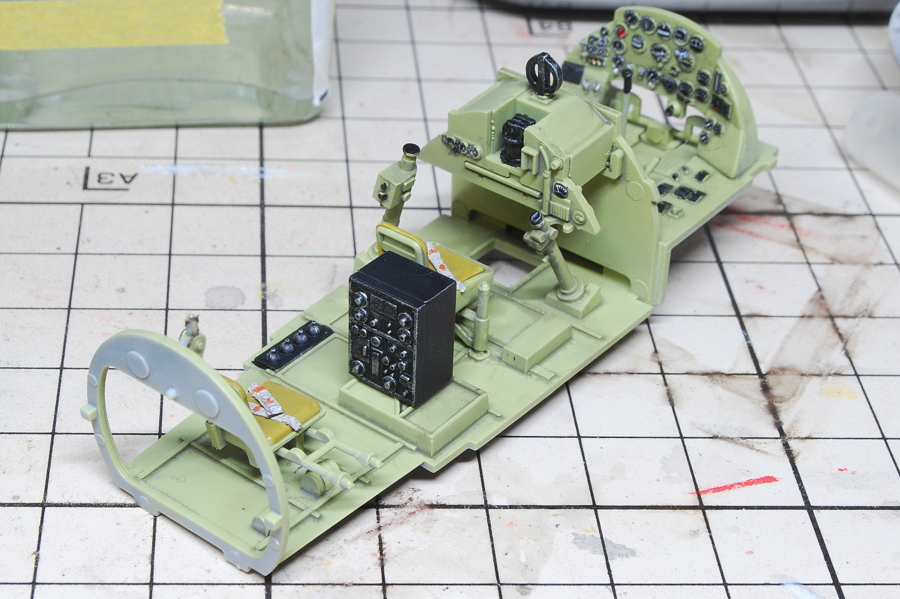 Overall, I did the washing and drying brush. There are no seatbelt parts in this kit. I added seatbelts of a pilot seat, back bombardment seat, and navigational seat. I paint small parts with a brush.
Overall, I did the washing and drying brush. There are no seatbelt parts in this kit. I added seatbelts of a pilot seat, back bombardment seat, and navigational seat. I paint small parts with a brush.
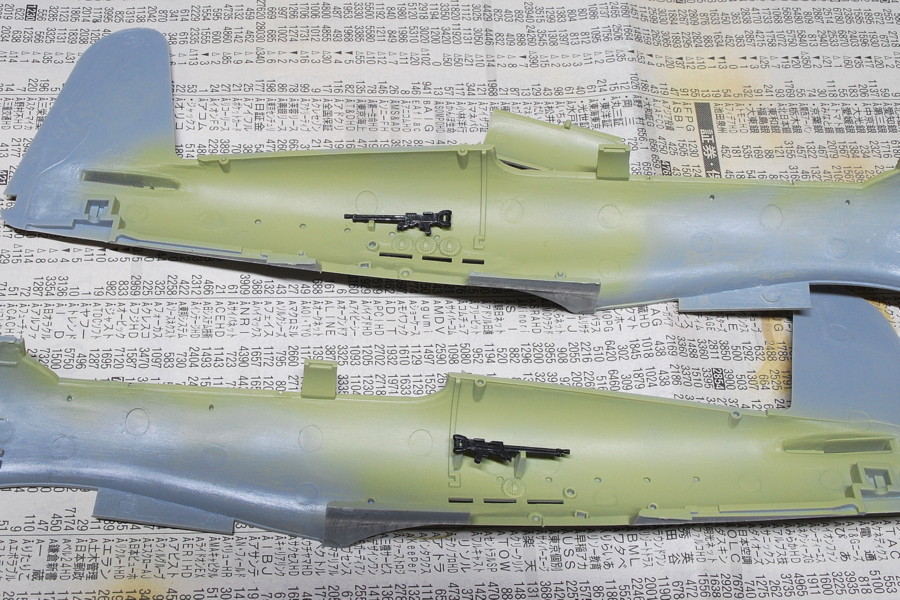 Are the machine guns placed in the aircraft? I cannot see them here after assembly. However, they painted these machine guns.
Are the machine guns placed in the aircraft? I cannot see them here after assembly. However, they painted these machine guns.
Likely, all of the six airplane models I ordered on February 26 at Lucky Model will finally be all shipped together. Since the card payment was already completed in March, I wondered about them. I am a little relieved after being shipped. Because it is sea mail, a long step forward to still arrive at hand, some overseas customers seem to have been waiting for about a year and a half. Depending on the manufacturer, it rarely reproduces, so there may be no choice.
(11-May-2018)
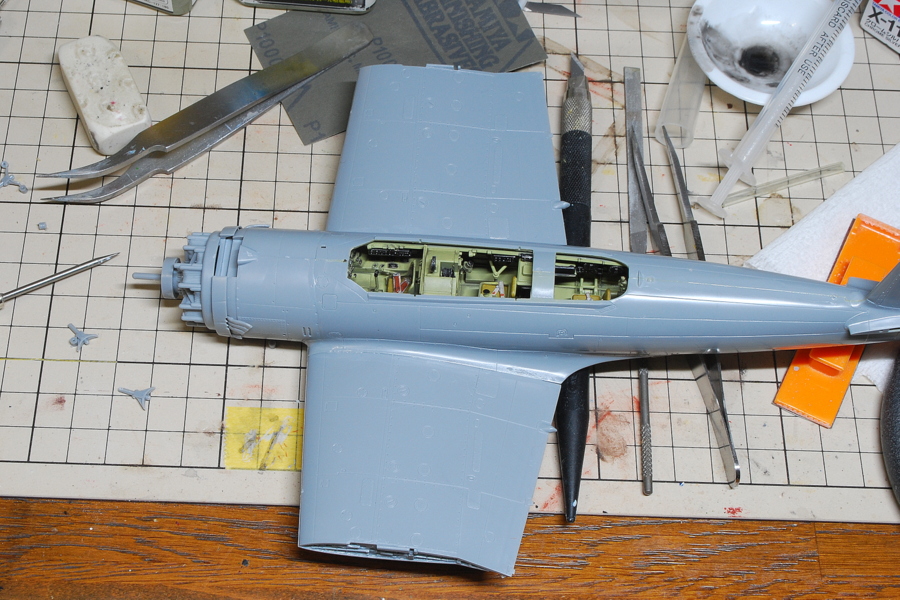 The assembly has advanced with fitting the cockpit.
The assembly has advanced with fitting the cockpit.
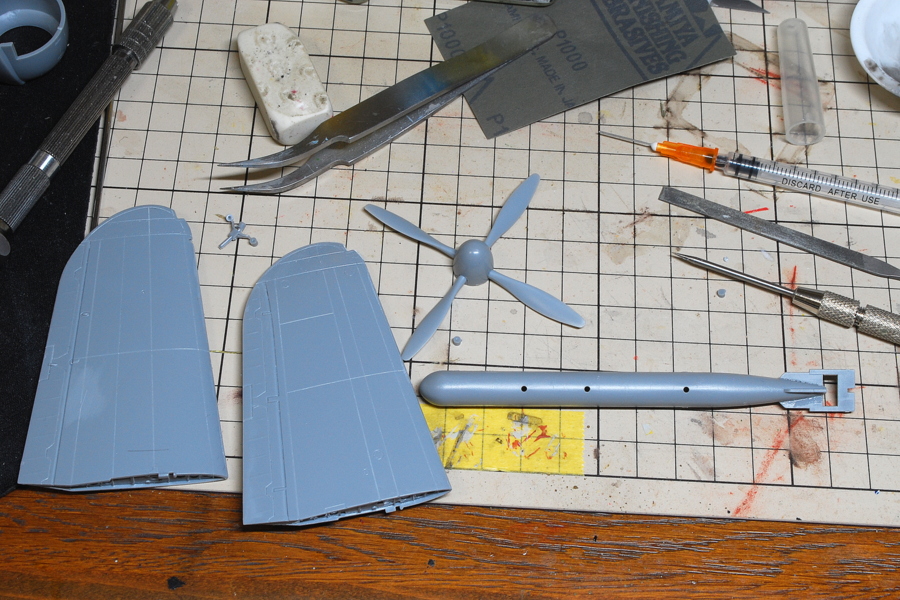 It seems to be a torpedo for the Ryusei kit. To attach to Tenzan, I have to fill three holes and open a new hole for this bomber airplane. Although it was written in a large explanation in this indication, I was just about ignoring and installing parts as it is. It’s dangerous. This syringe is convenient for gluing from the inside of the main wing. I thought that strength would increase if pouring adhesive from the inside. I prefer a longer needle…
It seems to be a torpedo for the Ryusei kit. To attach to Tenzan, I have to fill three holes and open a new hole for this bomber airplane. Although it was written in a large explanation in this indication, I was just about ignoring and installing parts as it is. It’s dangerous. This syringe is convenient for gluing from the inside of the main wing. I thought that strength would increase if pouring adhesive from the inside. I prefer a longer needle…
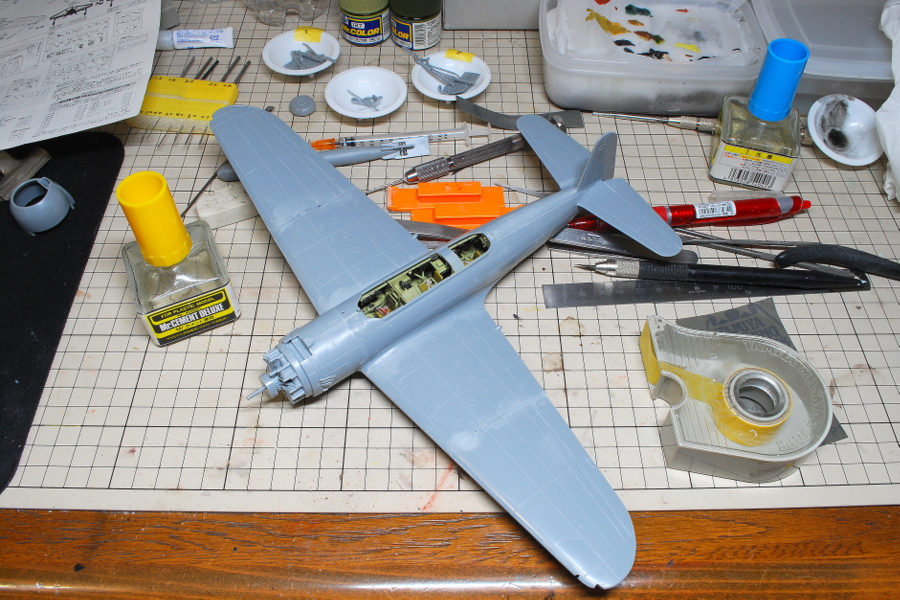 A panel line was a little shallower than my taste, so I re-carved it generally.
A panel line was a little shallower than my taste, so I re-carved it generally.
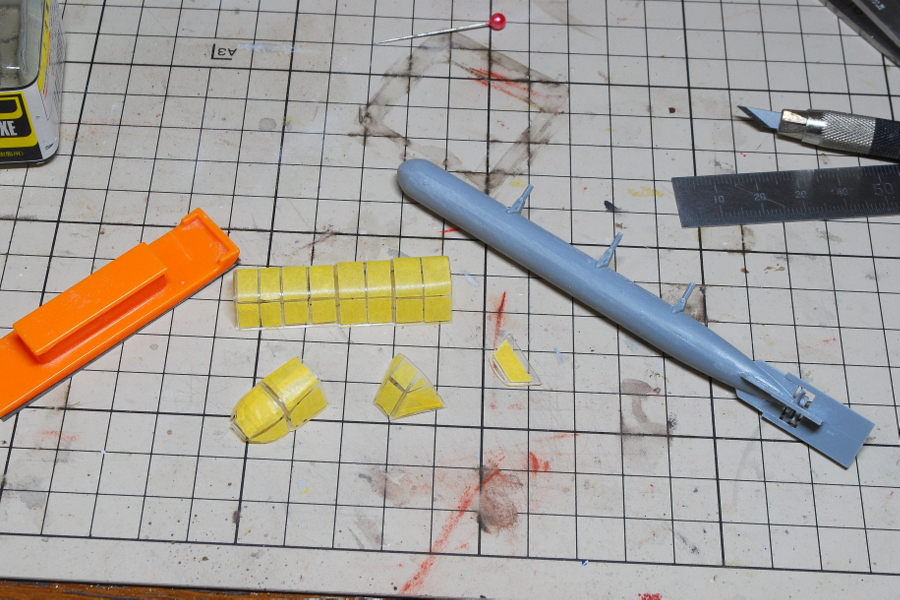 Since the torpedo is suspended downwards by two degrees, I think the three pylons are separate parts.
Since the torpedo is suspended downwards by two degrees, I think the three pylons are separate parts.
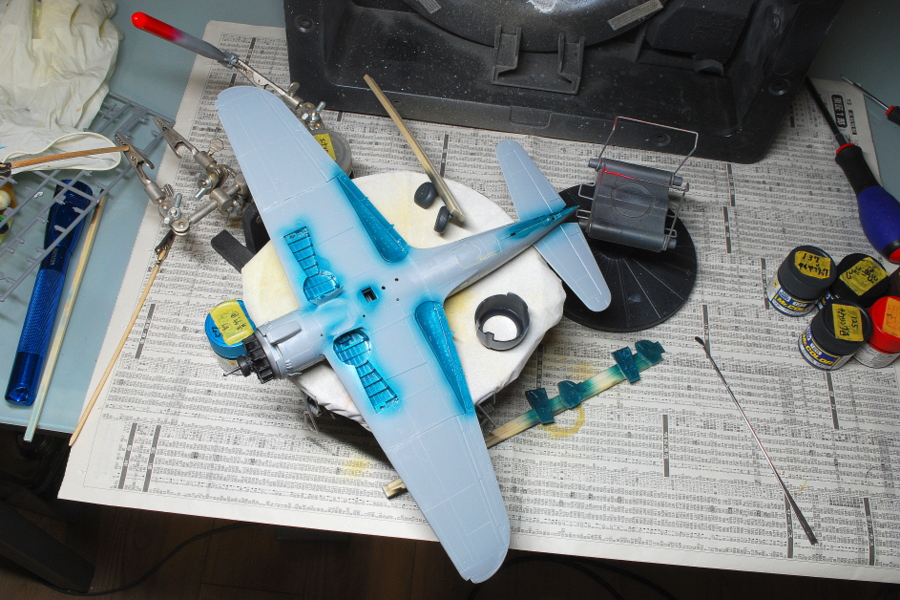 I painted the metallic blue-green. It may have been unnecessary to blow near the tail wheel.
I painted the metallic blue-green. It may have been unnecessary to blow near the tail wheel.
(13-May-2018)
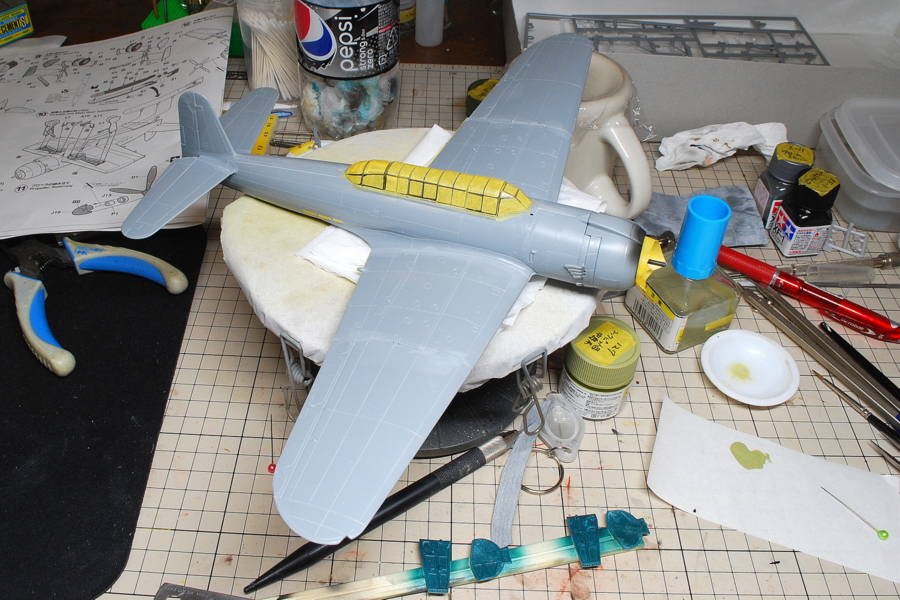 The canopy is extraordinarily long with a three-seater plane; masking will be massive. It is in a closed state; there is anxiety that mist enter if it does not adhere without a gap.
The canopy is extraordinarily long with a three-seater plane; masking will be massive. It is in a closed state; there is anxiety that mist enter if it does not adhere without a gap.
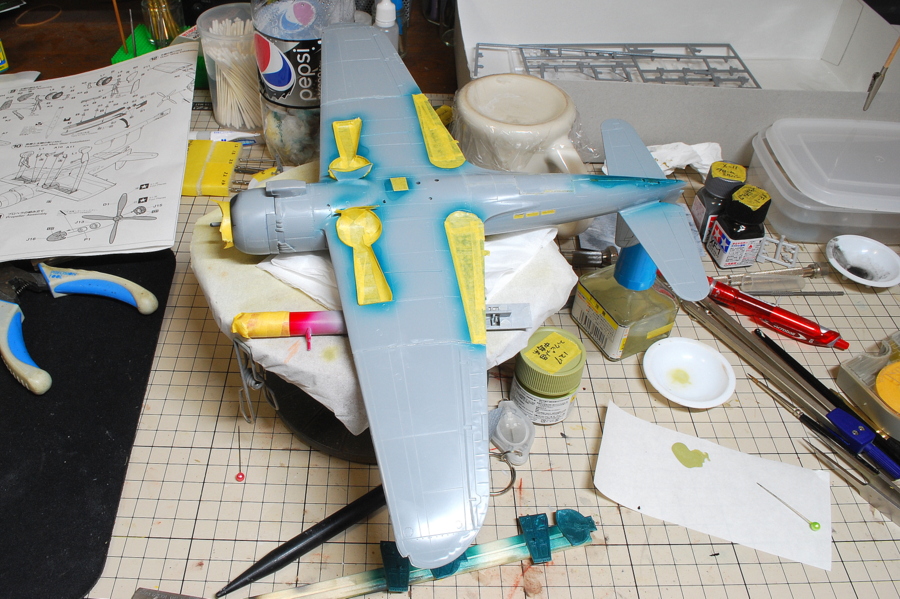 As unusual as myself, I’m doing precisely masking on the underside of the aircraft.
As unusual as myself, I’m doing precisely masking on the underside of the aircraft.
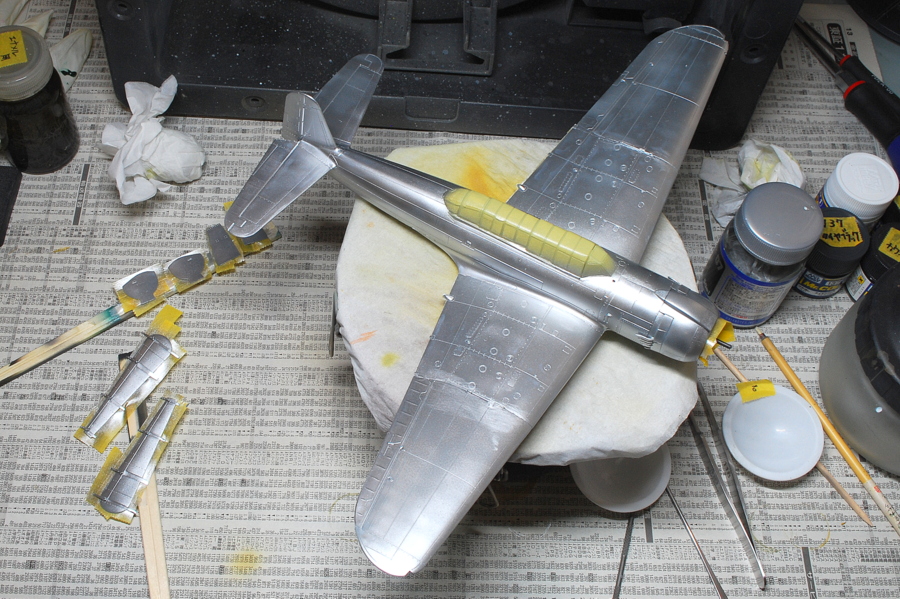 Foundation silver painting, and it’s my first challenge.
Foundation silver painting, and it’s my first challenge.
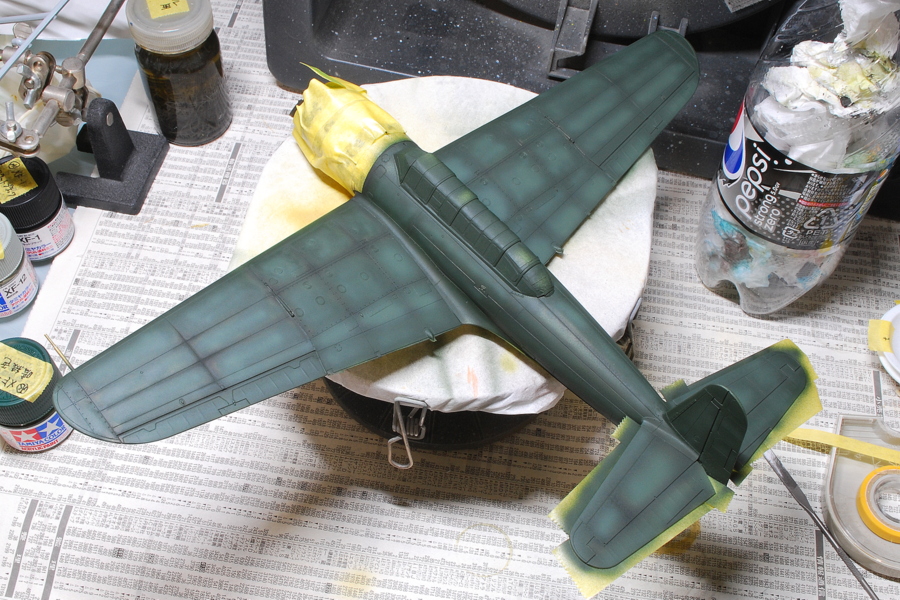 I paint it with a deep green color with shading.
I paint it with a deep green color with shading.
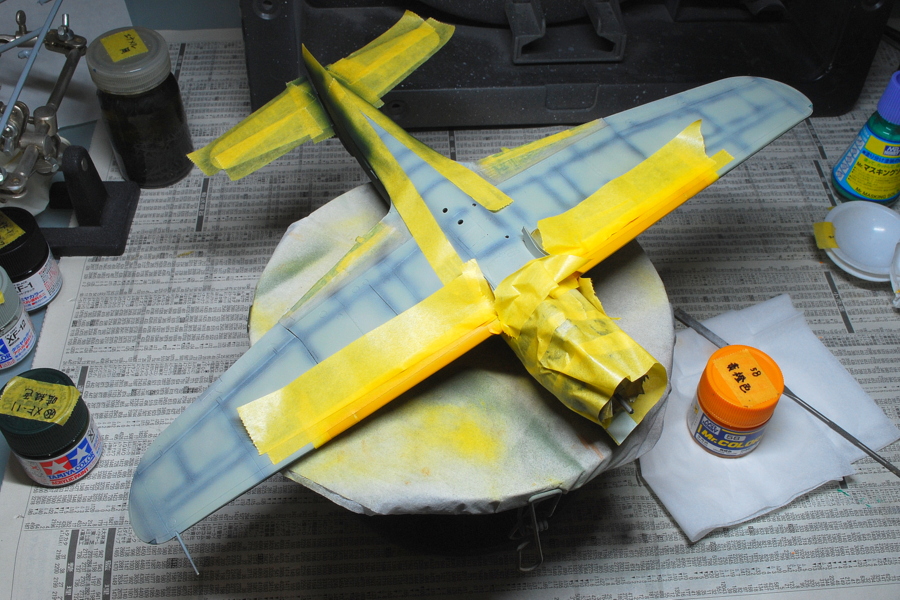 I thought a mandarin orange decal of the main wing would also be included that a cockpit panel decal is included, but it was not in it. Now I’m painting orange belts. Regarding results, finishing the painting in orange is better than using thin yellow color decals. Hasegawa’s decal is sometimes not so good in color.
I thought a mandarin orange decal of the main wing would also be included that a cockpit panel decal is included, but it was not in it. Now I’m painting orange belts. Regarding results, finishing the painting in orange is better than using thin yellow color decals. Hasegawa’s decal is sometimes not so good in color.
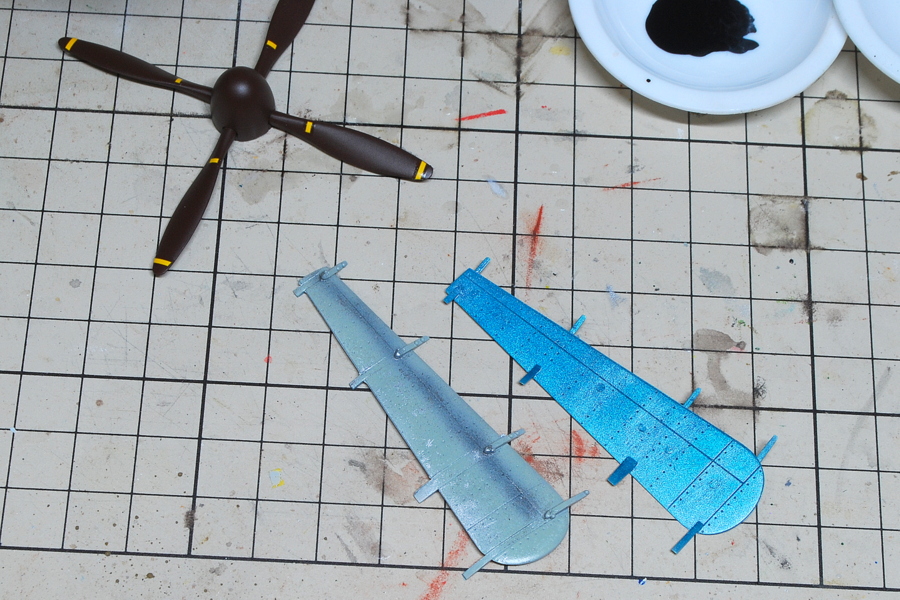 I painted the color of the front and back of the fowler flap, but I made a mistake. It was the opposite. I thought it would be fine in the closed state, but it does not solve the problem. I worked hard, such as peeling paint and the gradation, but it was in vain.
I painted the color of the front and back of the fowler flap, but I made a mistake. It was the opposite. I thought it would be fine in the closed state, but it does not solve the problem. I worked hard, such as peeling paint and the gradation, but it was in vain.
(16-May-2018)
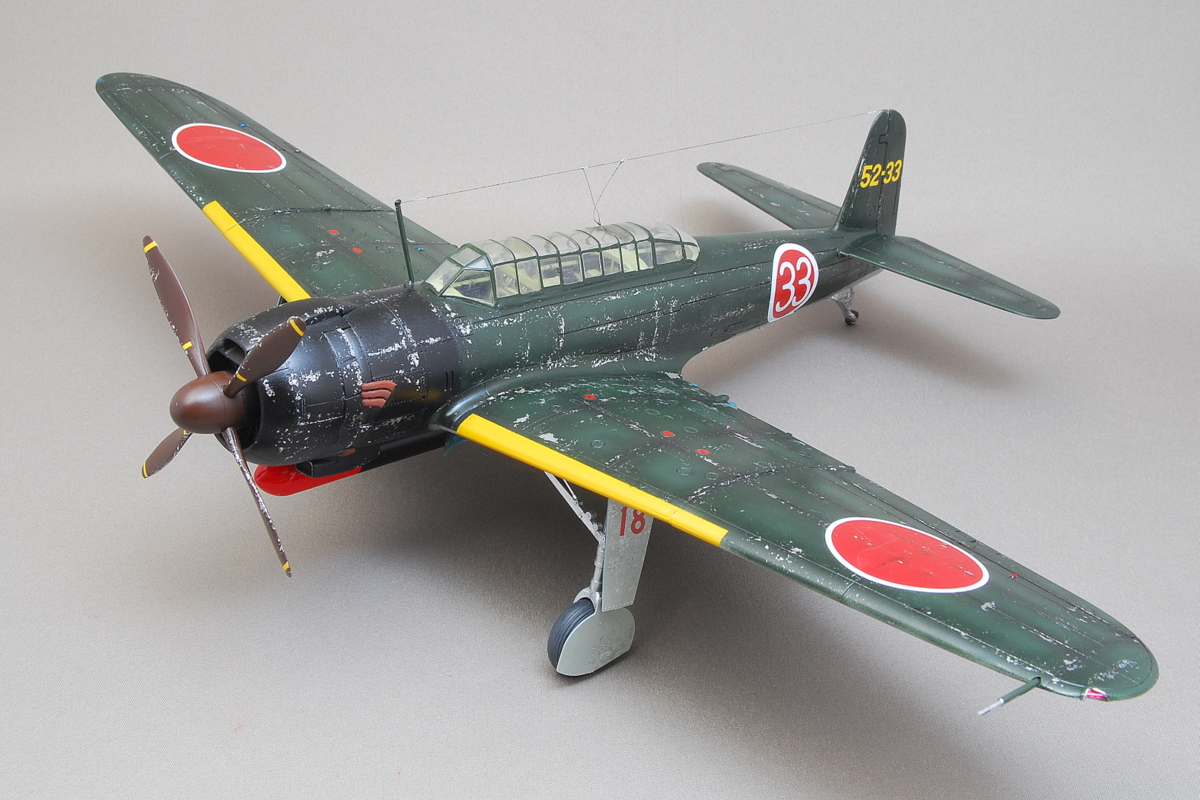 Tenzan has been completed finally. Tenzan is the successor of a Carrier-based torpedo bomber Nakajima B5N. There was a debate about whether the engine “Kasei” or “Homare” and Type 12 adopts the Kasei engine. There was a difference in opinions variously by Nakajima Aircraft and IJN by the easiness of the maintenance and results in the past.
Tenzan has been completed finally. Tenzan is the successor of a Carrier-based torpedo bomber Nakajima B5N. There was a debate about whether the engine “Kasei” or “Homare” and Type 12 adopts the Kasei engine. There was a difference in opinions variously by Nakajima Aircraft and IJN by the easiness of the maintenance and results in the past.
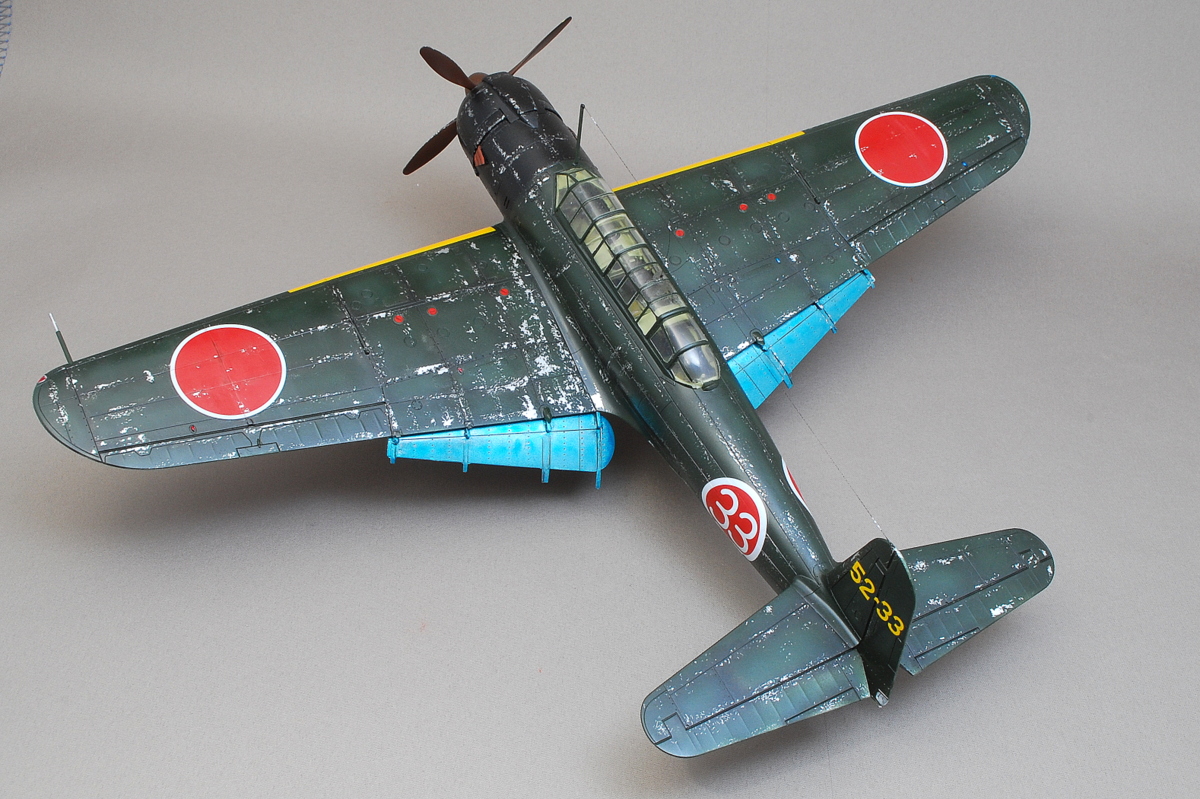 Greater East Asia War, the initiative shifted to the USA already, and the damage of Tenzan at Rabaul and Mariana was also intense. The first flight was in March 1941, and the mission began in August 1943. The gross production was about 1260.
Greater East Asia War, the initiative shifted to the USA already, and the damage of Tenzan at Rabaul and Mariana was also intense. The first flight was in March 1941, and the mission began in August 1943. The gross production was about 1260.
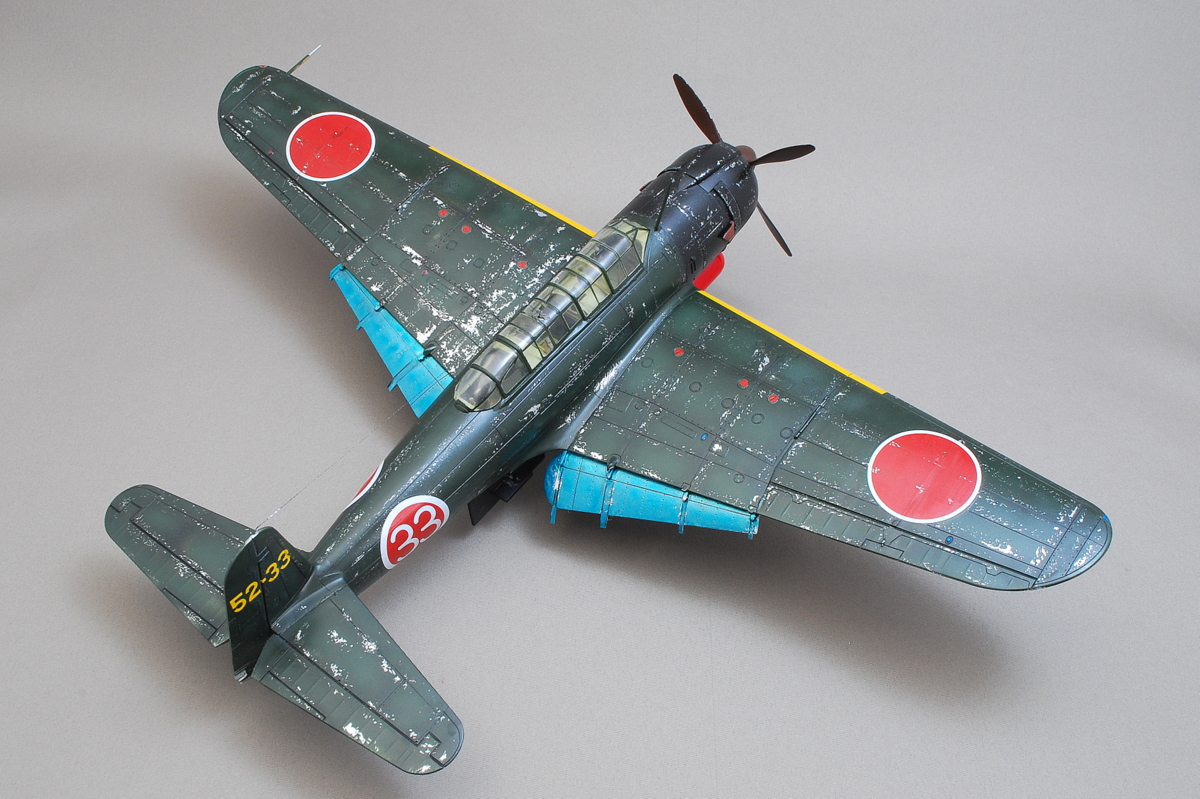 Also, When it was Iwojima and the battle in Okinawa, Tenzan was used as a suicide aircraft. Tenzan suicide attack caused considerable damage to the aircraft carrier Saratoga.
Also, When it was Iwojima and the battle in Okinawa, Tenzan was used as a suicide aircraft. Tenzan suicide attack caused considerable damage to the aircraft carrier Saratoga.
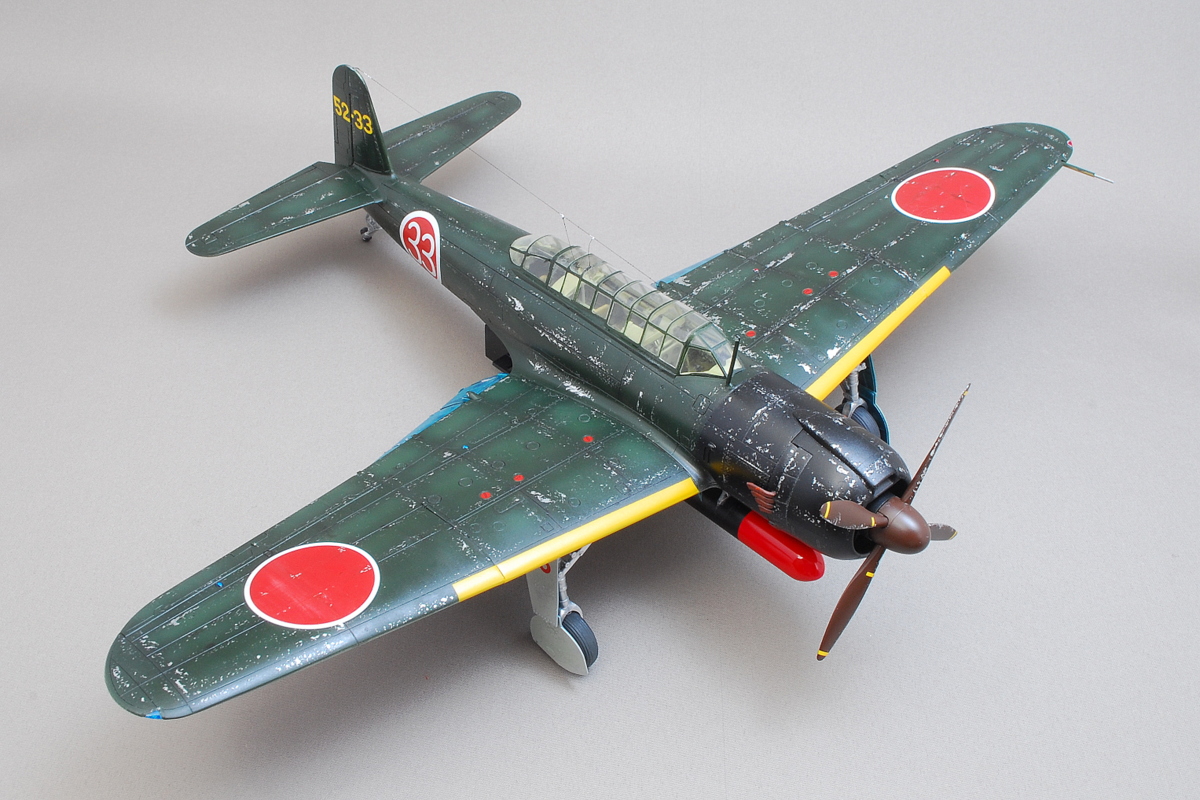
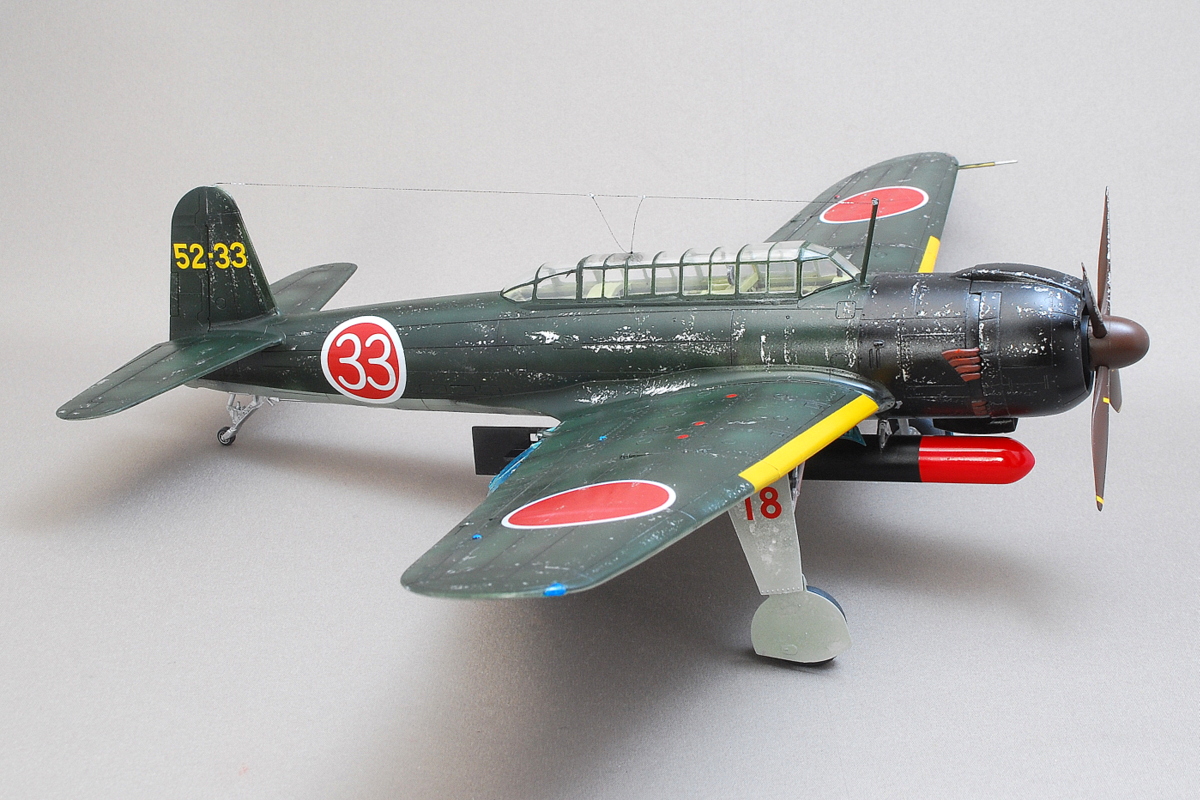 In the Sino-Japanese War, a unit primarily responsible for the ground attack, the First Flying Group, was initially renamed the 752nd Naval Flying Group. Afterward, this unit was active in Rabaul, Tarawa, Iwo Jima, etc. The marking is 256th Attack Squadron 752nd Naval Flying Group.
In the Sino-Japanese War, a unit primarily responsible for the ground attack, the First Flying Group, was initially renamed the 752nd Naval Flying Group. Afterward, this unit was active in Rabaul, Tarawa, Iwo Jima, etc. The marking is 256th Attack Squadron 752nd Naval Flying Group.
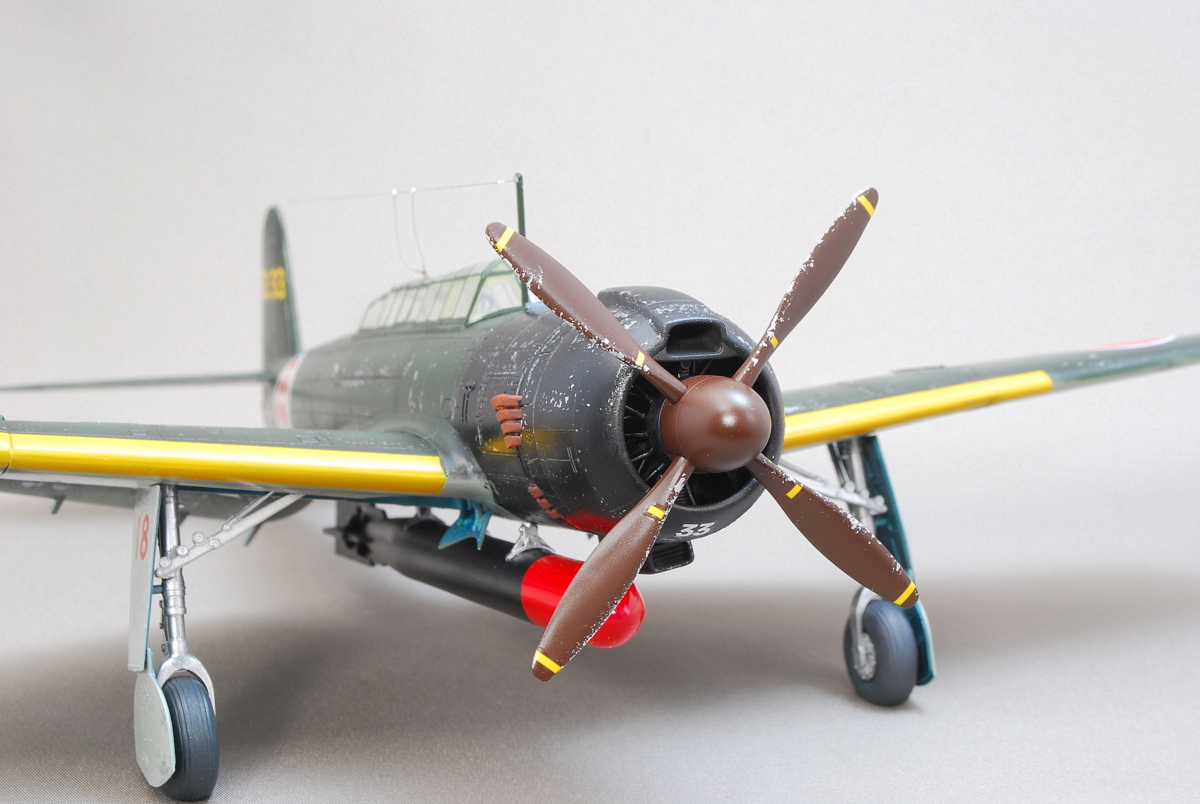 The propeller is Japan’s first four-blades. It cannot increase the number of blades that become heavier unless a big horsepower engine. However, increasing the number of blades will be challenging to have various trade-offs, such as lower fuel consumption.
The propeller is Japan’s first four-blades. It cannot increase the number of blades that become heavier unless a big horsepower engine. However, increasing the number of blades will be challenging to have various trade-offs, such as lower fuel consumption.
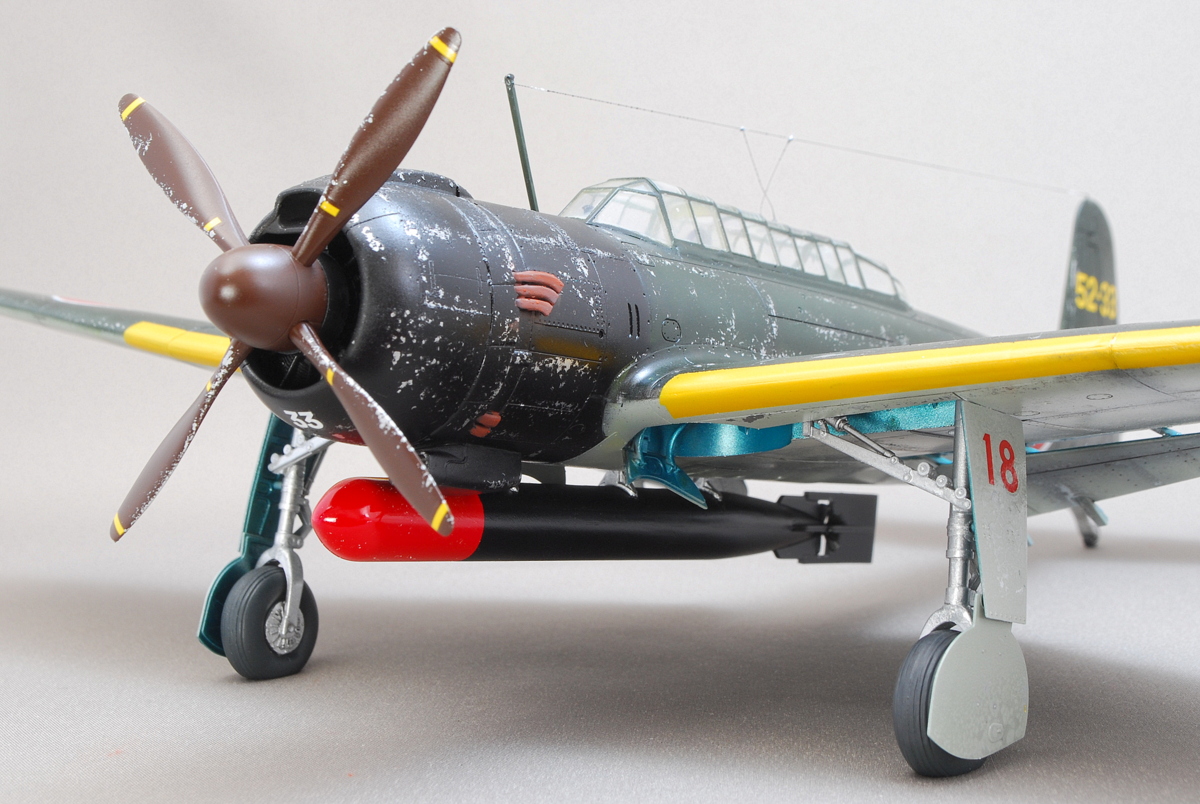
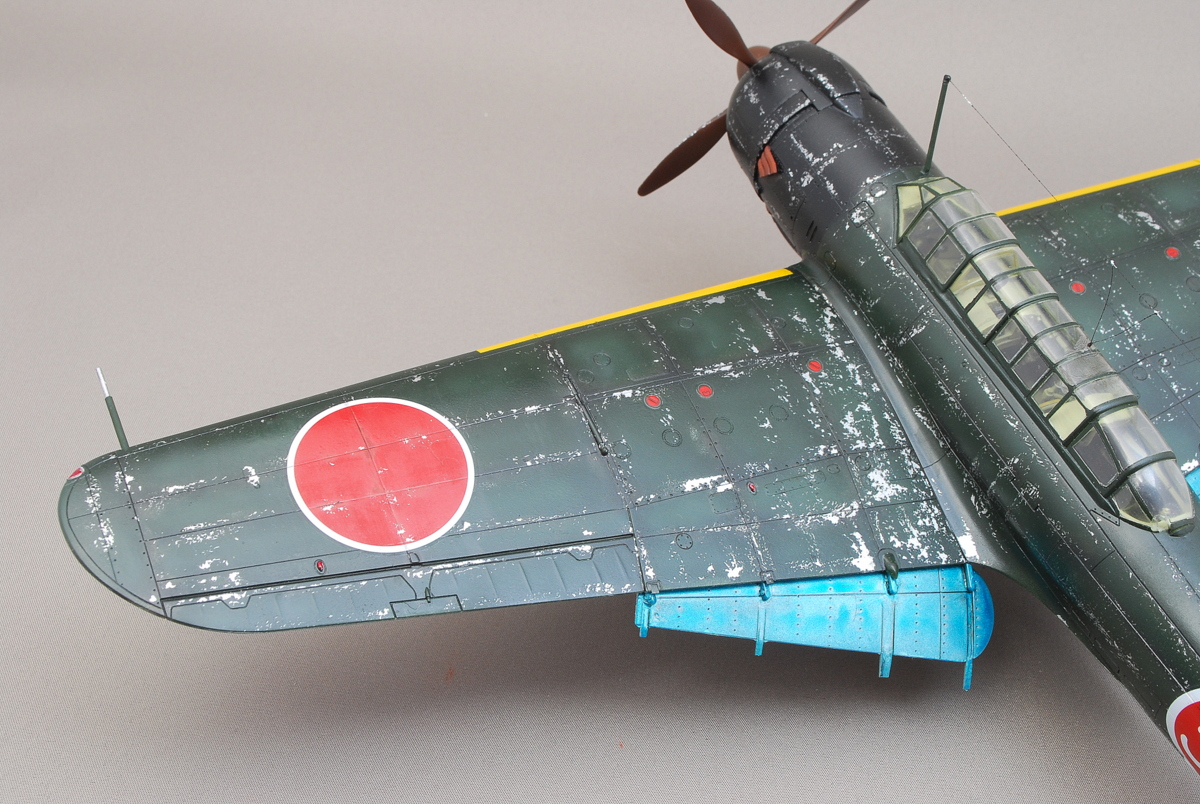 I wanted to try the hairspray technique on the silver base, and this was my first challenge. I tried several times and knew the trick. It is a good finish, including the condition of a gloss surface. I like to make planes clean, but I think the weathering at this degree is excellent.
I wanted to try the hairspray technique on the silver base, and this was my first challenge. I tried several times and knew the trick. It is a good finish, including the condition of a gloss surface. I like to make planes clean, but I think the weathering at this degree is excellent.
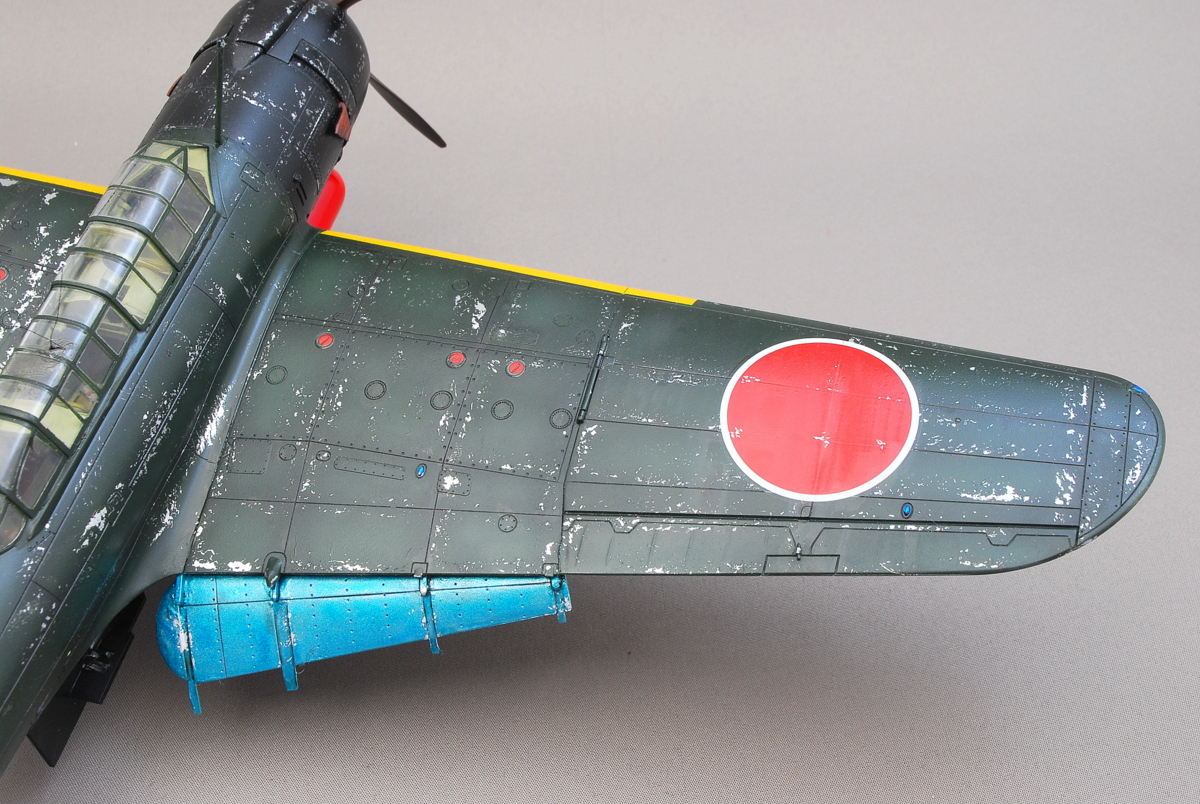
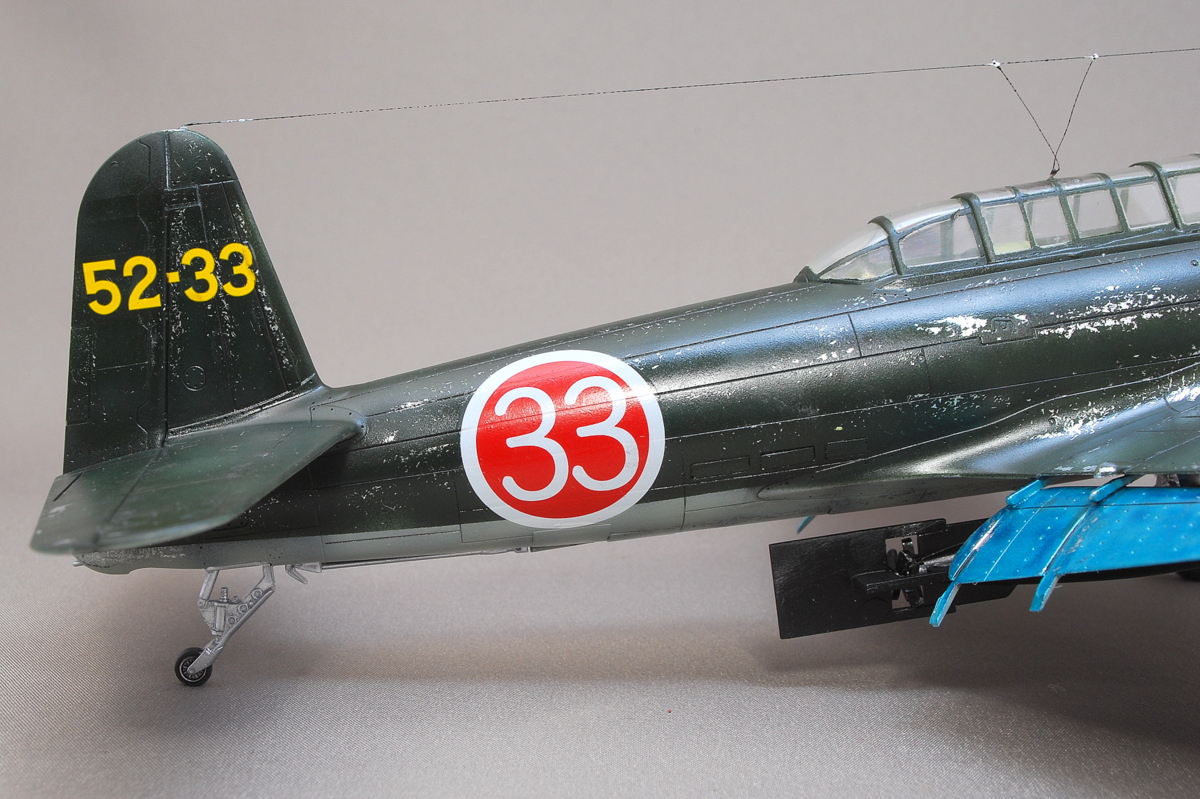
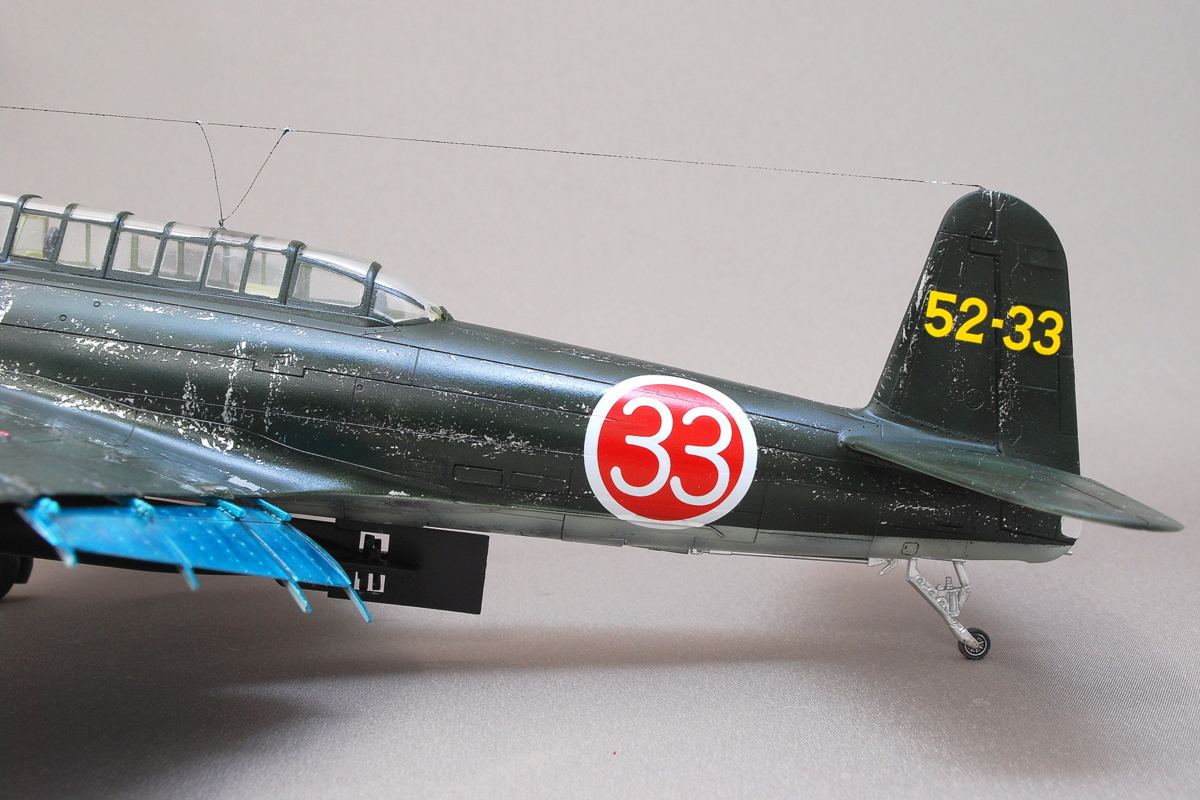
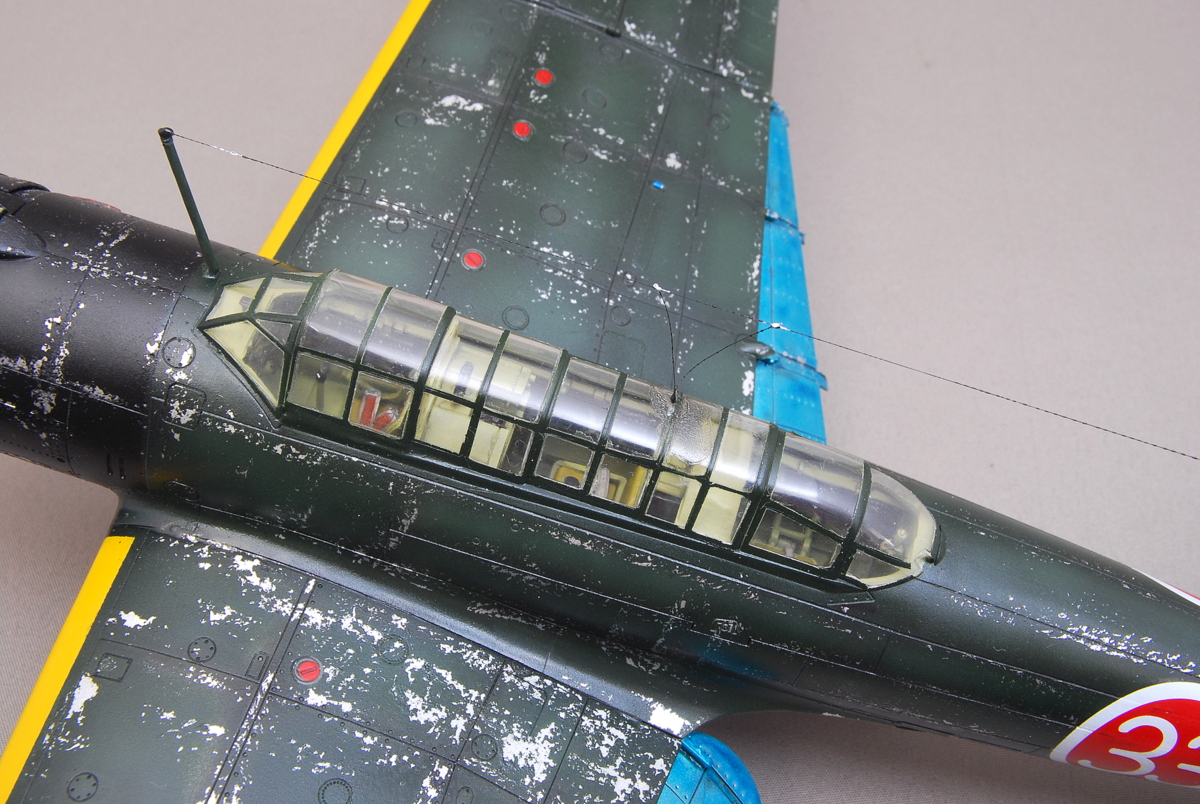 I attached an antenna wire to the final finish. It seems that the antenna line of Tenzan is partly out of the canopy frame on the way, which is difficult when I tried it like a ship model. The surface got dirty when it was over into the canopy using the curing accelerator of instantaneous adhesive. I wish I had kept it safe without challenging the problematic place, but it was too late. I recovered the surface with clear smoke, which became less noticeable, so I will assume it’s good this time. This kit requires attention to various points. Moreover, it is quite a large size, even 1/48 scale.
I attached an antenna wire to the final finish. It seems that the antenna line of Tenzan is partly out of the canopy frame on the way, which is difficult when I tried it like a ship model. The surface got dirty when it was over into the canopy using the curing accelerator of instantaneous adhesive. I wish I had kept it safe without challenging the problematic place, but it was too late. I recovered the surface with clear smoke, which became less noticeable, so I will assume it’s good this time. This kit requires attention to various points. Moreover, it is quite a large size, even 1/48 scale.
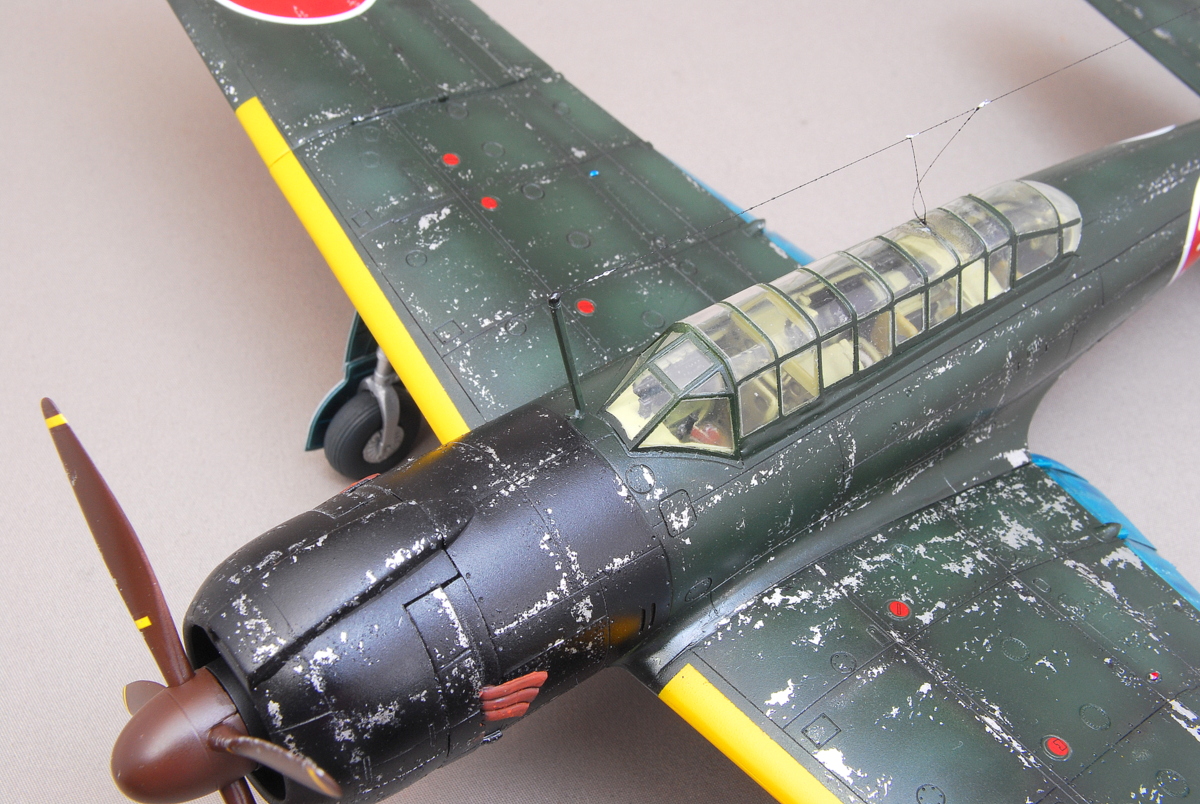
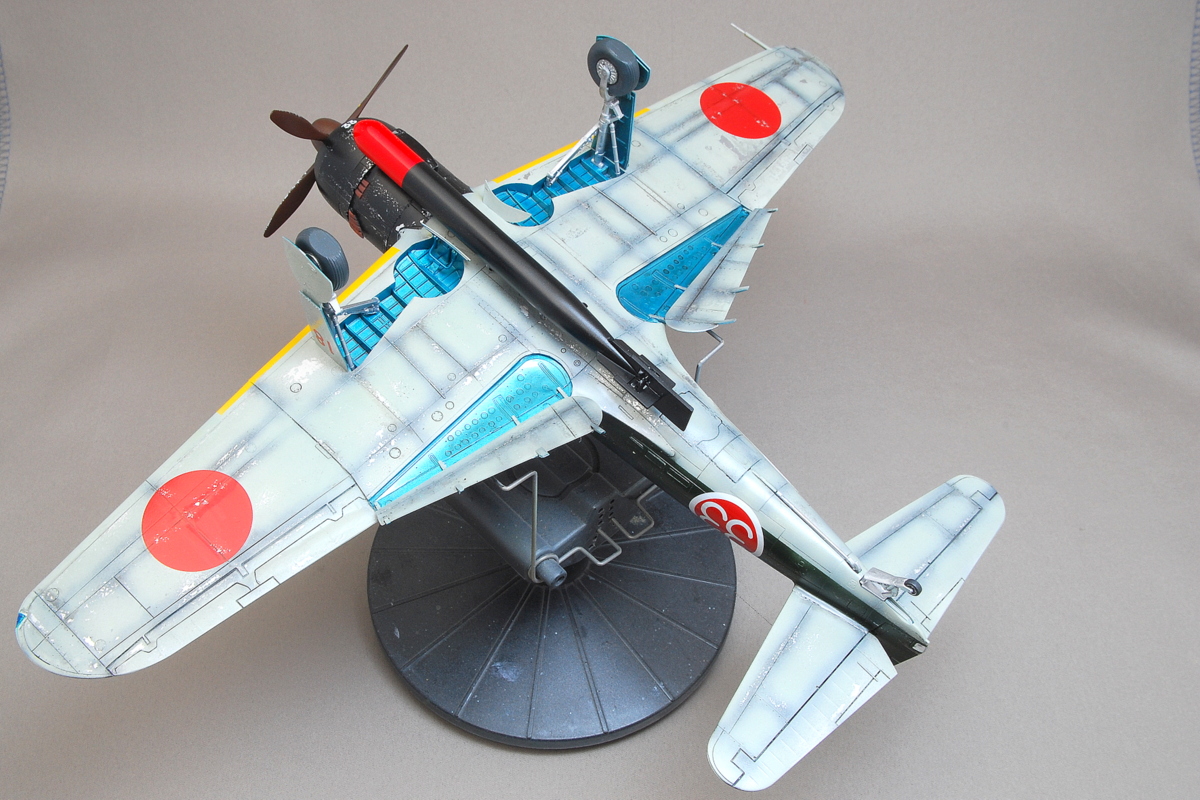 Torpedoes and landing gears are designed to be installed simply by inserting them into the plastic pipes. This is very easy to assemble. Even just inserting it is pretty sturdy, and I think that is not a problem. However, I did not remove them, especially for display, so I reinforced them with plastic glue and instant adhesives.
Torpedoes and landing gears are designed to be installed simply by inserting them into the plastic pipes. This is very easy to assemble. Even just inserting it is pretty sturdy, and I think that is not a problem. However, I did not remove them, especially for display, so I reinforced them with plastic glue and instant adhesives.
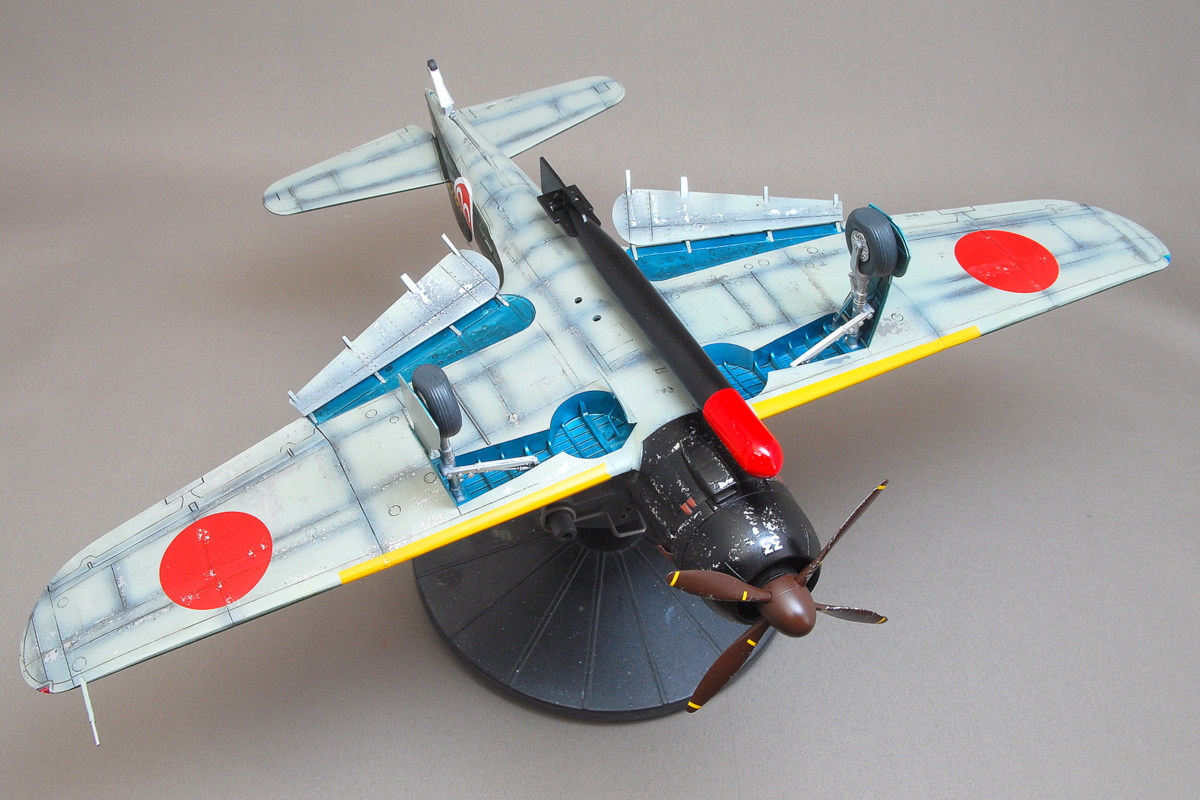 The main armament is the type 91 kai 2 torpedo. It is equipped with only one. It seems high under pressure with aiming the spirit of a single shot. Avoid interference with the cooling air intake by bringing the suspension to the right from the axis.
The main armament is the type 91 kai 2 torpedo. It is equipped with only one. It seems high under pressure with aiming the spirit of a single shot. Avoid interference with the cooling air intake by bringing the suspension to the right from the axis.
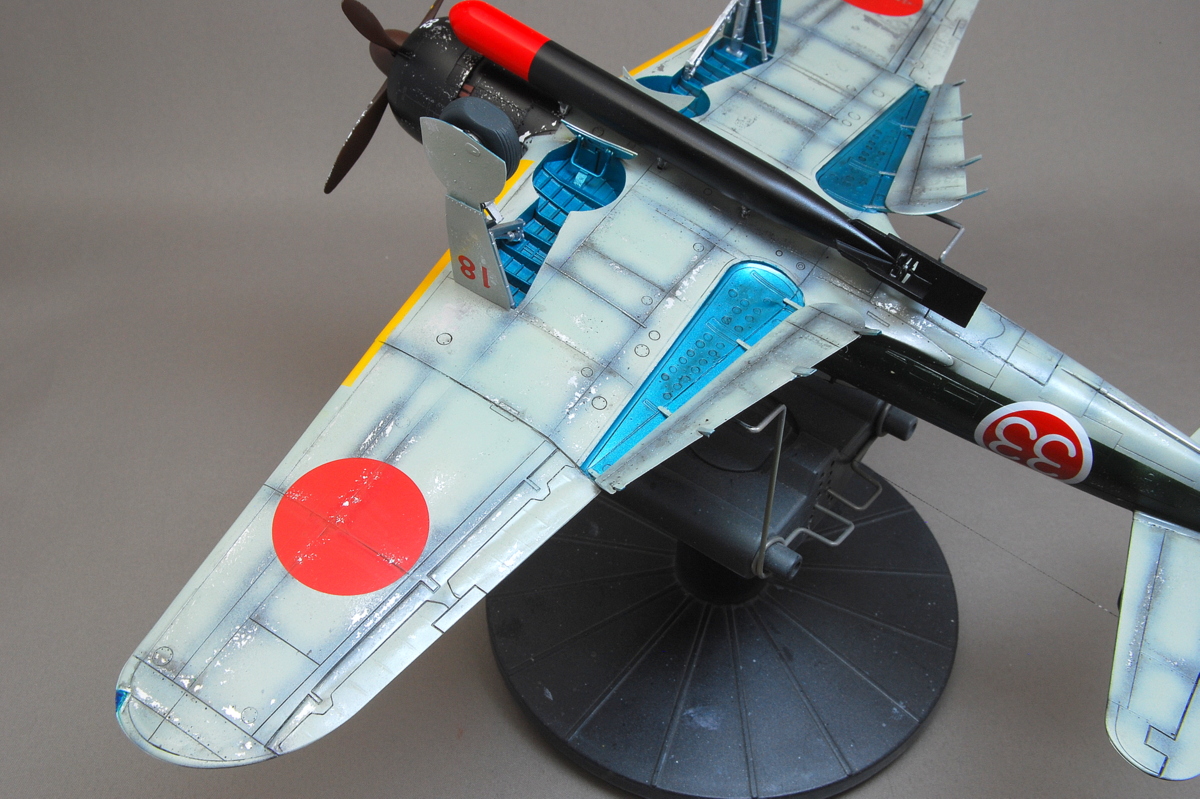 By the way, the type 91 kai 2 torpedo was 20,000 Japanese yen then. Converting to the current price seems equivalent to about 100 million yen (1 million USD).
By the way, the type 91 kai 2 torpedo was 20,000 Japanese yen then. Converting to the current price seems equivalent to about 100 million yen (1 million USD).
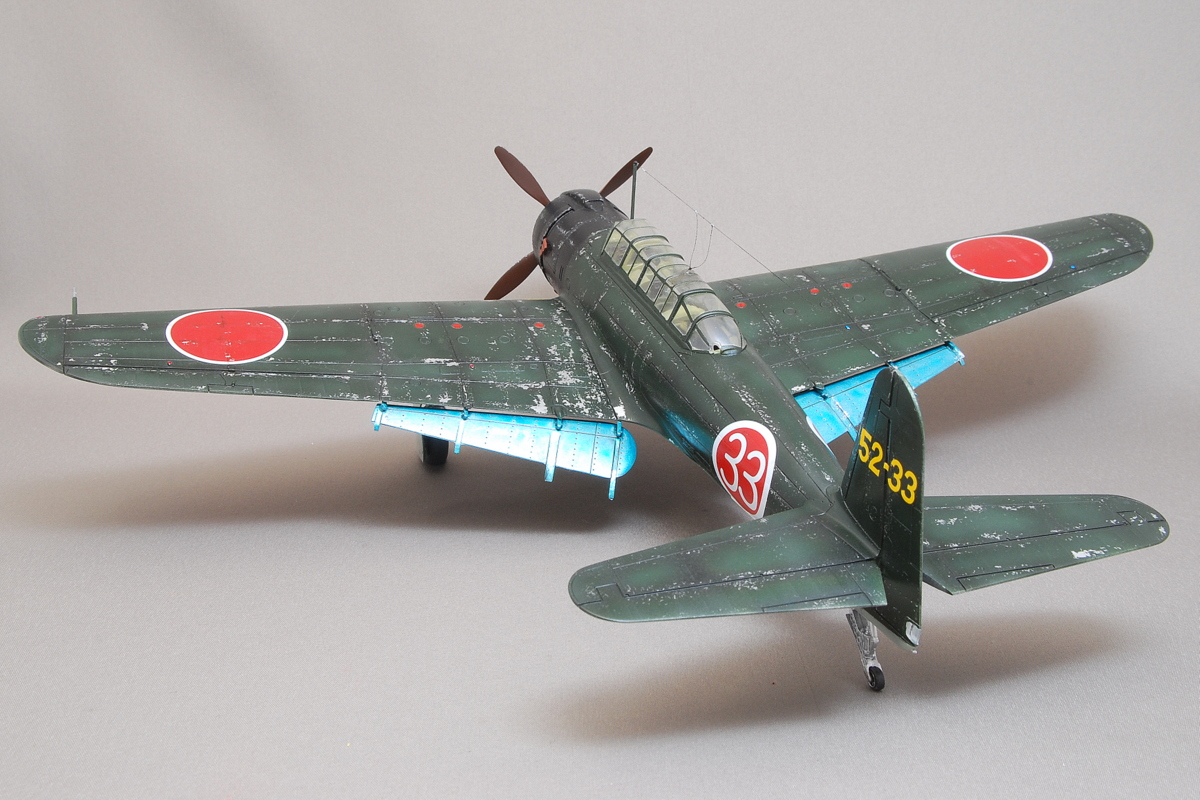
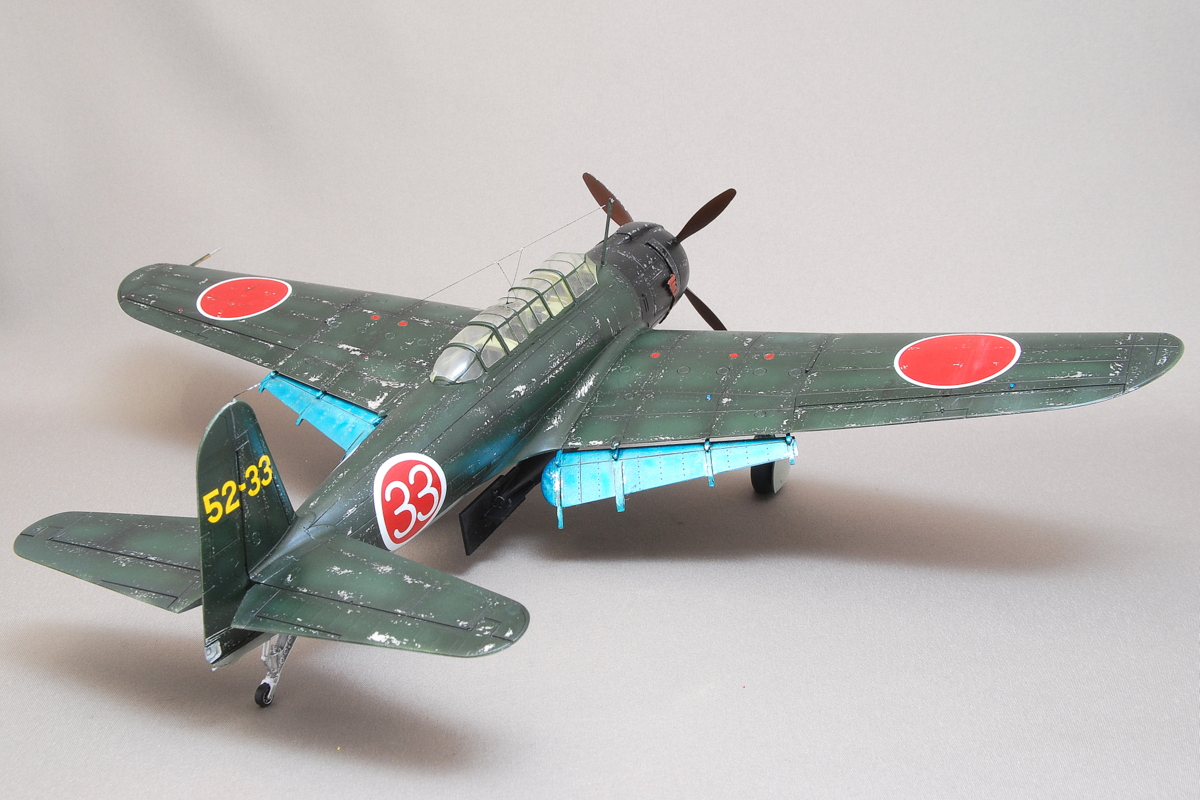
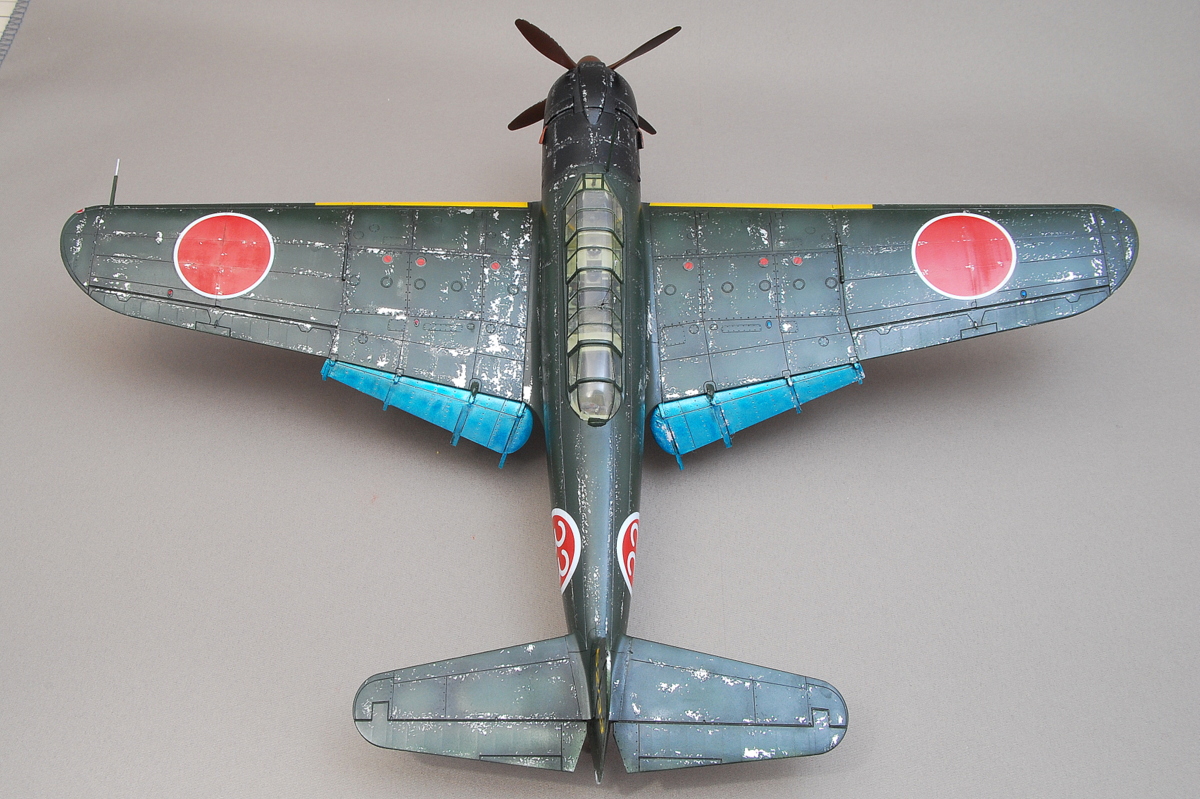 How about the effect of putting in a black inking on deep green color? I have made a whitish inking in the past, so this is dependent on taste. The black ink does not make pointed self-assertion compared to a bright color. I think it will become a calm finish as a whole.
How about the effect of putting in a black inking on deep green color? I have made a whitish inking in the past, so this is dependent on taste. The black ink does not make pointed self-assertion compared to a bright color. I think it will become a calm finish as a whole.
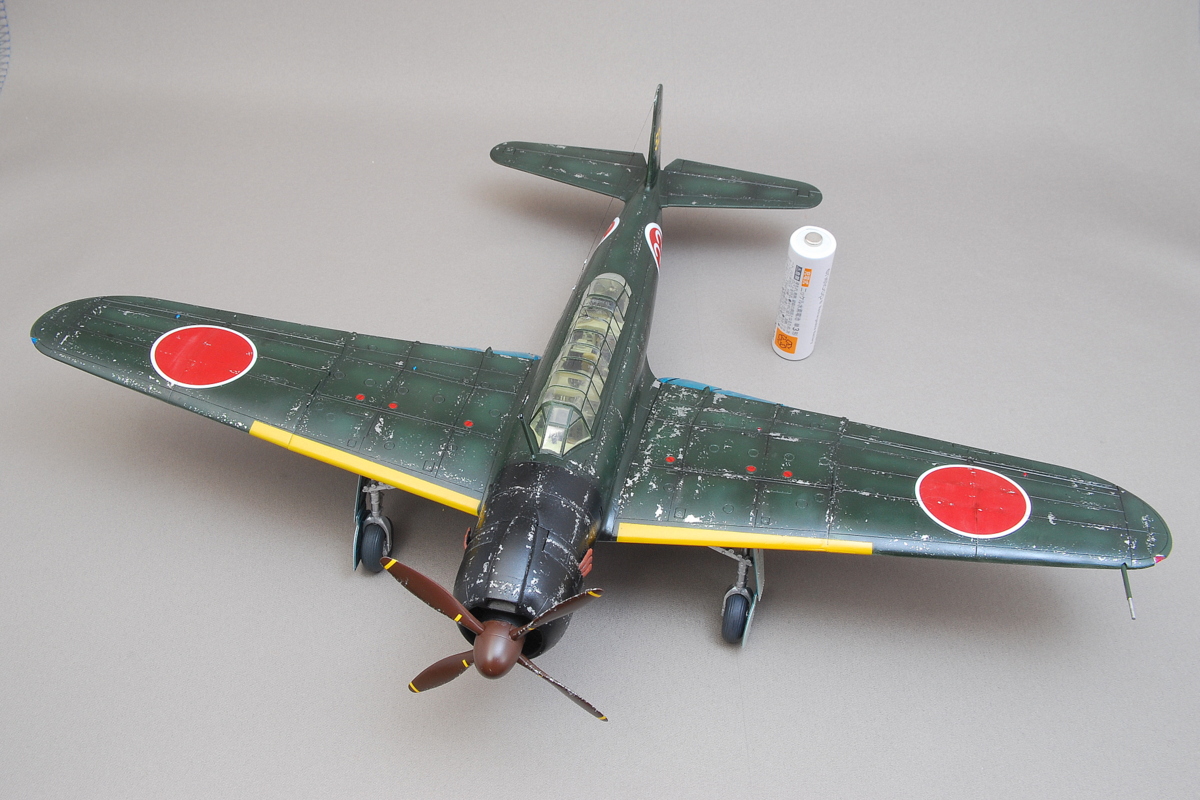
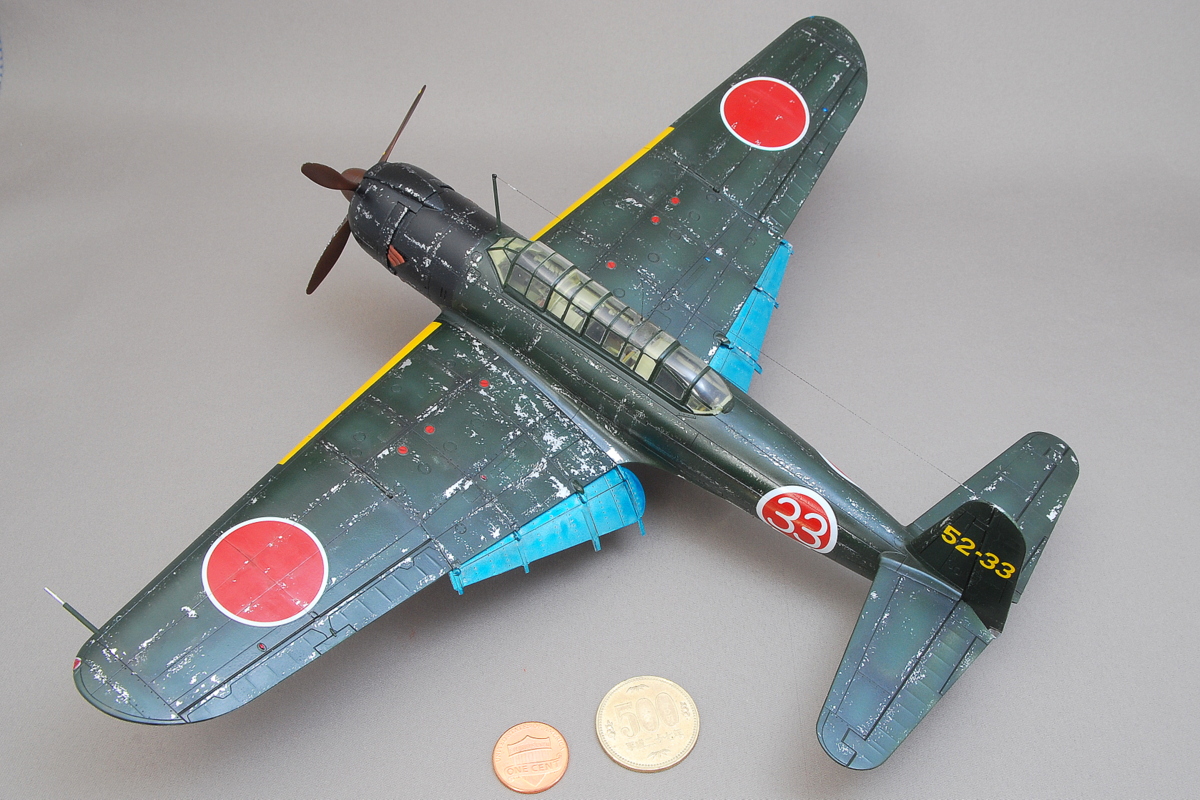 When completed, it will be pretty significant, as you can see, compared to this 500 yen coin. This kit can be finished in the main wing folded state and is enjoyable. It is a more powerful impression of the main wing deployed than the folded state. It was a military aircraft of the Imperial Japanese Navy, which was big and powerful with a three-seater.
When completed, it will be pretty significant, as you can see, compared to this 500 yen coin. This kit can be finished in the main wing folded state and is enjoyable. It is a more powerful impression of the main wing deployed than the folded state. It was a military aircraft of the Imperial Japanese Navy, which was big and powerful with a three-seater.
The other day, I saw the Turner Exhibition in Shinjuku. Mr. Turner seems to have been a pretty artisan character. Watercolor, oil, and engravings were very elaborate and fantastic. Because it was a weekday afternoon, There were few viewers relatively, so I could relax and appreciate it. I had a relaxing afternoon with my wife. In the last room, Van Gogh’s “Sunflowers,” Gauguin’s “Lane At Alchamps, Arles,” and Cezanne’s “Pommes et serviette” were exhibited, and I could see them enjoyable and relaxed. I also came here two years ago, so I think I was watching them. Occasionally I make models of battleships, and Turner’s Marine Picture section is fascinating. I think that ship at that time was still sailboats and steamships. Turner’s movie seems to have been made some years ago, so I would like to watch it sometime.
The three pictures below are from the Seiji Togo Memorial Sompo Japan Nipponkoa Museum of Art, 42nd floor of one of the highrise buildings in Shinjuku Tokyo, Japan.
(19-May-2018)

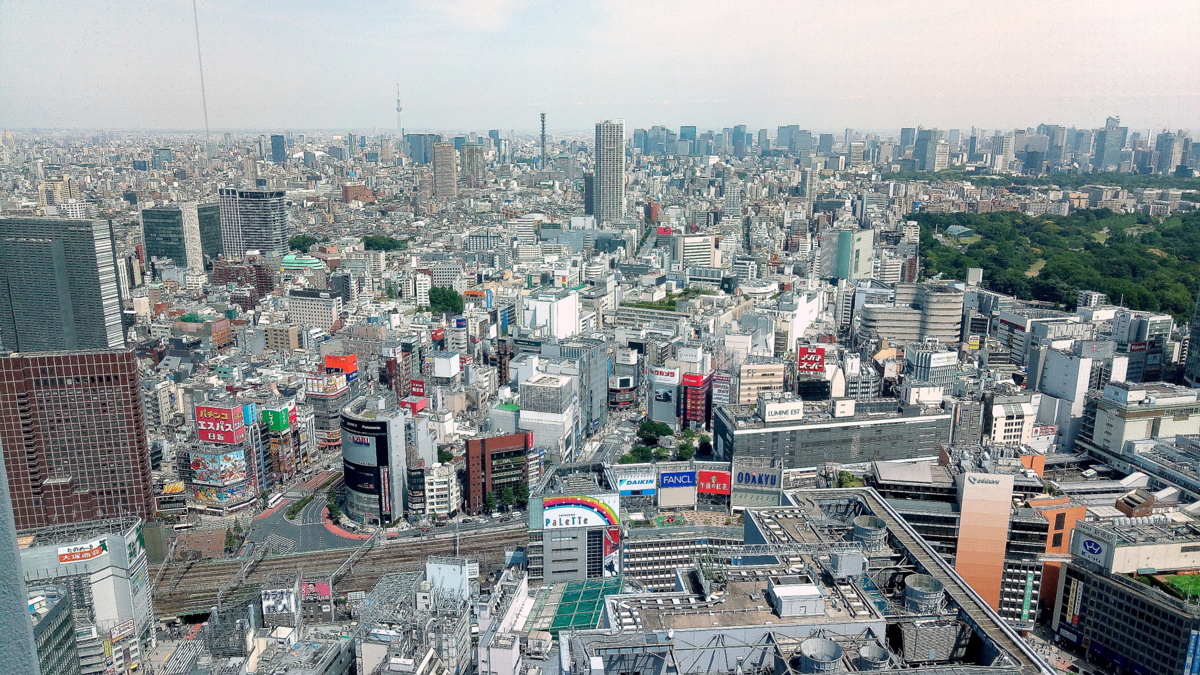
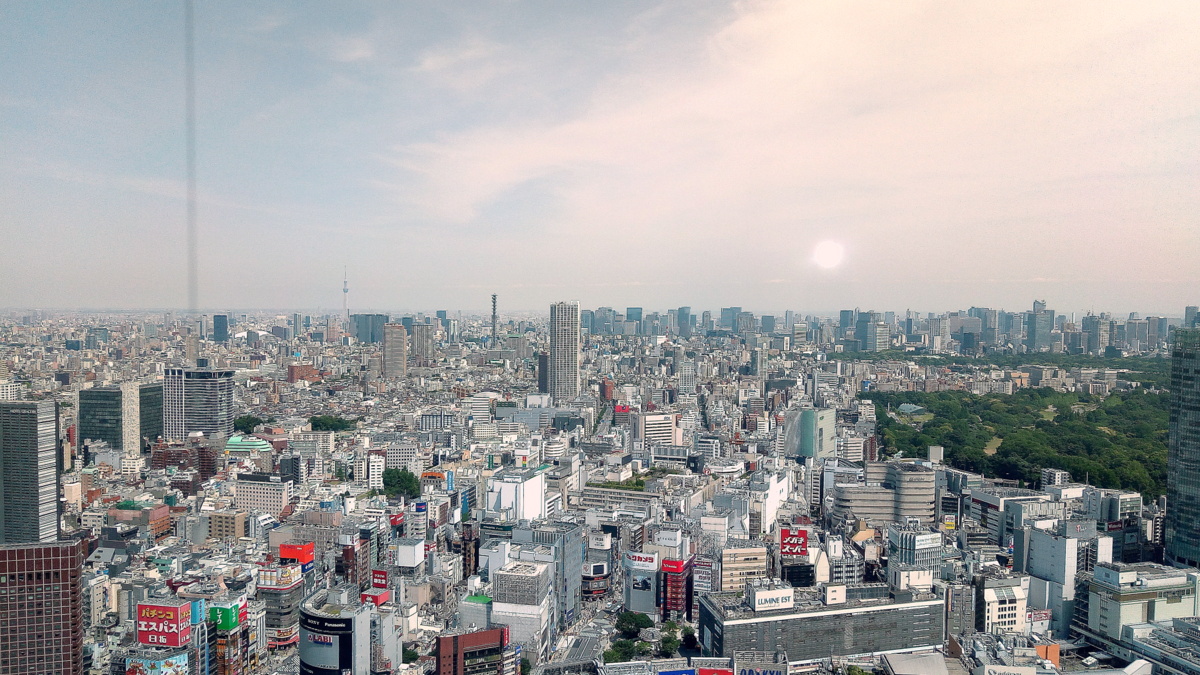
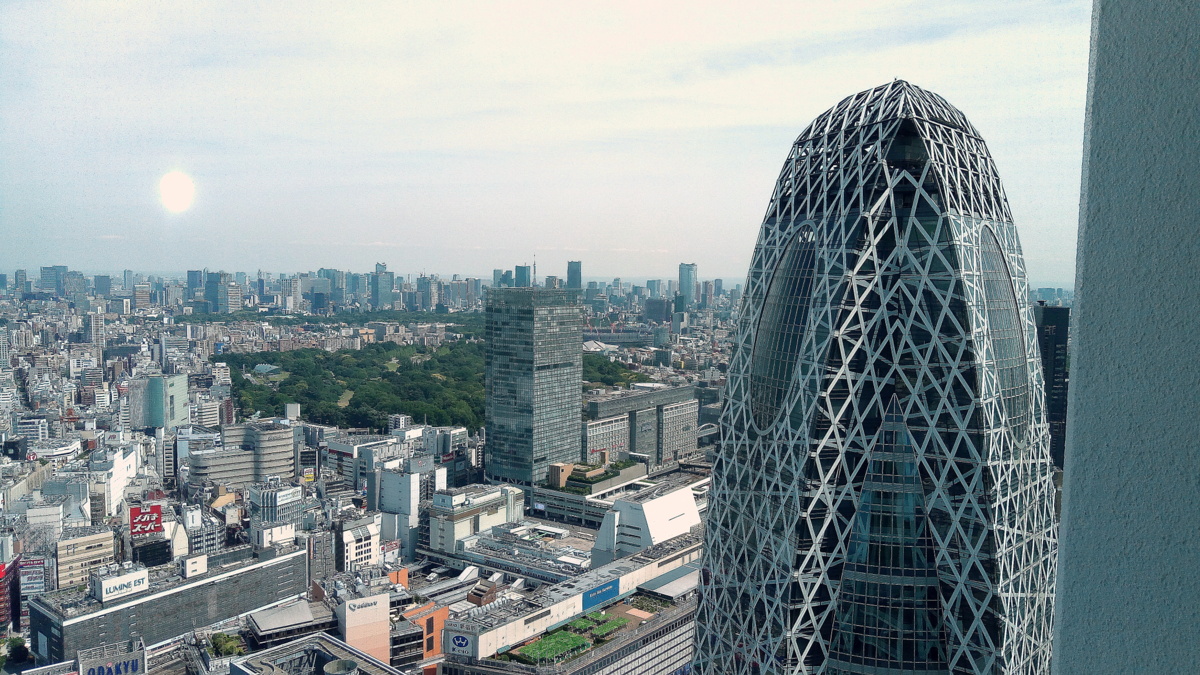


コメント